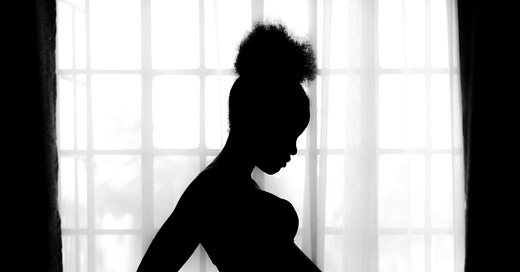I realized how much I relied on others to be advocates for my needs
Social media breaks and tossed out birthing plans
Hey yall,
Have you ever taken a social media break? Like, deactivated or deleted your accounts and just went off the grid for a while? This is my first time doing this and I’m currently going on week three without Instagram. Out of all my other social networks, I hands-down used IG the most, and every week when my phone would recap my usage, IG was always hovering somewhere at the top.
So, I decided to try a break for a while. Instagram ads were getting so spot on that #supportingsmallbusinesses became my credit card shouting, “Free me!,” the definition of beauty was giving one-dimensional, and ultimately, I wanted to see if I used my phone less without it. While I haven’t seen any miraculous differences in life since I got off the app, I have felt a lot more energized in my day-to-day which is a huge win.
The other thing I have noticed since being on social media less is the loss of that feeling of connectedness to not just friends, but friends of friends and “followers.” That knowing of what everyone is doing—whether you want to or not and usually without actually having to speak to the person. It bred this false feeling of connectedness that instantly evaporated as soon as I got off the app. Is there any benefit to remaining loosely connected to people you wouldn’t keep up with if it weren’t for IG? I do feel a little less in the loop but I also don’t care to be in it in the first place.
Would you or have you taken a social media break? How’d it go for you?
Anyway, enough of me rambling, enjoy this week’s story!
Take care,
Anayo Awuzie
EIC of Carefree Mag
Getting Kicked Out Of My Birthing Center
by Natasha Ngaiza
I was always certain pregnancy would be one of the best times of my life. I imagined it would somehow lift me into some higher spiritual plane where I would be more connected with the world around me. I imagined walking proudly down the street with my perfectly round belly, skin glowing, eyes shining.
I would probably do lots of prenatal yoga and have intense cravings for mangos and finally have a natural childbirth that would be intense but beautiful and even more empowering than the nine months of pregnancy.
Then I got pregnant. I was hit with antenatal depression in my first trimester, violent mood swings, horrible food aversions, fatigue, and the feeling that my body was out of my control. And not only was my body out of control, but even the care I wanted to provide my body was out of my control.
When I was seven months pregnant, I got a phone call from a midwife at the birthing center I had been attending since week six of my pregnancy. The birthing center which had advertised itself as being "committed to caring for women and families" and fostering " a strong partnership and trust between a woman and caregiver" let me know over the phone, that they could no longer keep me as a patient.
There had been a meeting about me. At this meeting, they decided that they didn't want to take a chance with the small uterine fibroid I had. The fibroid which they had repeatedly reassured me for the last eight weeks, was nothing but a small annoyance, no big deal, nothing to get worried about.
Although nothing about my fibroid had changed since my last appointment only one week prior, they had changed their mind about me. I was out. And that was the end of the conversation. They offered a quick, "so sorry" with no referrals to other hospitals and no advice about what to do next before hanging up. It felt like being dumped. I was heartbroken. And confused.
Although my pregnancy was unplanned, as soon as we saw the positive sign on the pregnancy test, my now-husband and I immediately and excitedly got to work as responsible soon-to-be parents. We ordered books, took weekly photos of my growing belly, subscribed to babycenter.com, and found a birthing center right outside of Philadelphia, with glowing reviews.
I loved the idea of having my child in a birthing center. It seemed to be the best of both worlds: an intimate, home-like atmosphere with midwives and doulas, but only a block away from a well-respected hospital with which they were also affiliated.
I gushed about their compassionate, woman/patient-centered philosophies to family and friends, my husband teared up during their orientation’s video presentation, and when my mother-in-law came to visit we made sure to give her a tour of the facilities so she could see where her first grandchild would be born. Everything seemed perfect.
At 18 weeks, my midwives spotted a small fibroid on the outside of my uterus. Like any first-time mother, I panicked, imagining the worst, but they quickly reassured me that a subserous fibroid like the one I had, never caused any complications. An ultrasound confirmed this and I continued my monthly appointments as usual.
Until the phone call that abruptly ended it all. After the midwife hung up, I laughed. I was too shocked to be angry yet. But then I called my husband. His shock immediately manifested into anger and questions that I had forgotten to ask my midwife during the breakup call. He emailed the clinical director of the birthing center and politely demanded that they meet with us in person, to give a more detailed explanation of why they let us go. She politely refused.
I called back and asked if they could help me find a new birthing center or hospital. They quickly ran through a list of local hospitals and clinics. Then warned me that it would be difficult to find a new health care provider at this stage since I was already entering my third trimester, so I better “act fast.” Um, thanks?
What had gone wrong? We had arrived at every appointment on time, were polite and friendly, had asked questions but not too many. They never told us that there might be a possibility they would let us go.
For the week following the breakup, we tried to remember every meeting we ever had with them. It wasn’t that we questioned their decision (although from everything we had been told about subserous fibroids, and mine, in particular, it did seem shady). Perhaps the fibroid DID put me in a high-risk category. Maybe they foresaw the emergency C-section I ended up having at nearly 42 weeks pregnant (completely unrelated to the fibroid).
But really? Over the phone? With no prior warning? With no help in moving forward? And then refusing to meet us in person, not once but TWICE? It went against everything they supposedly stood for. They were supposed to be advocates for pregnant women. They were supposed to provide a safe, enjoyable space for women and their families going through a life-changing experience.
In racking our brains for answers the question of race and racism appeared as a possible factor. I’m a black woman, the child of Tanzanian immigrants. My husband, a Chilean international student with a noticeable accent. The birth center was located in one of the more affluent (white) parts of the area.
All of our midwives had been white. All of the patients we had ever seen had also been white.
It was true that we had never felt quite welcome there. My appointments had always been professional, but a little cold. We always chalked it up to the constant rotation of midwives, but maybe it was more than that? There was that strange comment a midwife had made about us doing the best thing for our child by being in an interracial relationship.
But what about that dark-skinned black woman in their promotional video?! What about the picture of that black midwife hanging on their wall?! Throughout our seven months with them, I had held onto those images as reassurances that I was a welcome presence in their space.
The funny thing is, my entire pregnancy had been riddled with a series of let-downs and deflated dreams. Getting kicked out by the birthing center was just another hole in the fantasy I’d built about pregnancy. And I did not even end up having the blissful, natural childbirth I assumed I would. Almost everything on the well-thought-out, the seemingly mild birth plan we naively handed to our labor team, went out the window. But interestingly, by the end of it all, I did feel empowered.
I realized how much I had always relied on others to be advocates for my needs instead of teaching myself to speak up and fight for what I needed. I had relied on the birth center to make decisions about my body and wasn’t prepared to defend myself when I was mistreated.
I assumed that a written, “well-researched” birth plan was good enough, but then couldn’t find the spoken words to deny my aggressive induction.
Up until my pregnancy, I was just a scholar, an academic. I could research and write and find the “right” institutions and the “right” people to do the real, dirty work for me. But the truth is, there is no room for that in the world of pregnancy and parenting.
After being rudely and abruptly denied health care at such a late stage in my pregnancy, I was forced to cultivate my activist voice. I knew that I had to learn how to speak up, if not for myself, then at least for my daughter.
It was also a mini-lesson about parenting: no amount of planning and reading can prepare you for it. It’s a messy, unpredictable job, and all of our plans and ideas about “how-things-should-be” should not overshadow what’s happening in the moment.
Enjoyed this week's storyletter? Tap the heart & share it! 😍
Share on Twitter | Share on Facebook | Share via email | View past stories
This story was originally published by xoJane.








I truly enjoyed the story, but I kept wondering if the issue was ever taken up with the birthing center. They were ridiculous and shouldn’t be left to escape the consequences of their actions.